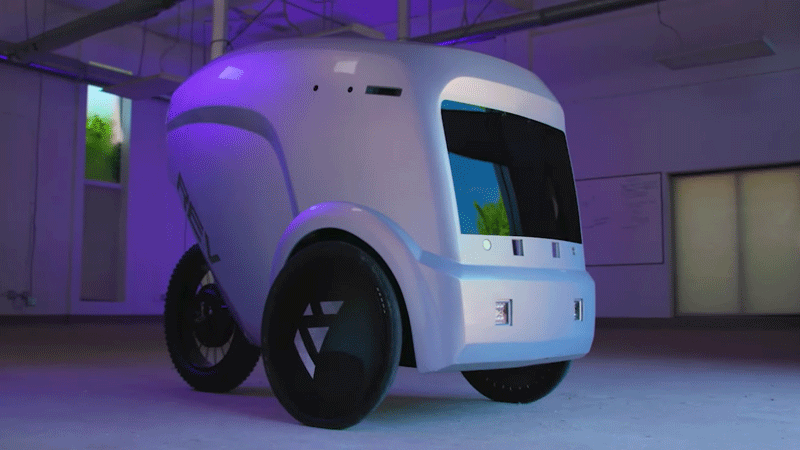There’s no shortage of innovative autonomous-vehicle companies out there, from Starship rolling around the sidewalks of college campuses and Washington, D.C., to Nuro delivering groceries in on-the-road vehicles. But REV, developed by Refraction AI, fits right between those models, figuratively and literally.
The five-foot tall, four-foot long vehicles are designed to drive at top speeds of 15 miles per hour and operate for 12 hours on a single charge. It’s a lot like other autonomous operations, as the vehicle arrives and alerts a restaurant, the staff punches in a code and puts the food inside, and it ferries the food to its final destination.
REV, however, has the unique mobility method of using both roads and bike lanes. So it takes full advantage of the burgeoning bicycle infrastructure that’s sweeping across the nation, which just happens to be expanding along with the same key delivery-user demographics.
It’s also piggybacking on the Detroit-area automaker legacy, fabricated in the same facilities that once churned out American cars for about $4,000—much less than an autonomous car.
Co-founder Ram Vasudevan said that was essential for keeping the economics in line.
“We want to build something that makes the economics work. We’re using affordable hardware,” Vasudevan told the Detroit News. “We’re not spending Bentley money to drive around your tacos.”
That pricing is a key factor to keep the price affordable for restaurant operators, which are paying as much as 30 percent of each delivery order. To deliver via REV, Refraction AI charges 15 percent.
To be fair, that is still high when it comes to slim restaurant margins, but it’s more palatable for restaurant operators like Ji Hye Kim, who operates Miss Kim, a Korean restaurant spun out of Ann Arbor institution Zingerman’s.
“Grubhub costs are unaffordable to us,” Kim told the Detroit News. “Such services are basically just for marketing.”
And one of the key features of the vehicle, it’s designed to take on that pesky foe for half the country: winter. REV is already forging through ice, slush and snow in Ann Arbor. The company plans to roll it out to Boston and Madison, Wisconsin, later this year as well for some extra winter education. The company also plans to expand into Palo Alto, California, maybe to give the bots a break from the crummy weather.
Take a look at the wintery bot below:
Refraction AI plans to expand to 60 vehicles over the next six to 12 months, with each market having a “nest” for the bots to charge up and stay safe when they’re not operating. The Livonia, Michigan, headquarters will transform into a home base to monitor the vehicles across the country.
The trick, of course, will be users and foodservice operators utilizing the devices at scale. The four locations sending out food with the bots during this pilot program will have to expand aggressively. Sidewalk-bot maker Starship partnered with Postmates and Nuro partnered with Kroger for groceries and Domino’s for pizza delivery. Domino’s, as it happens, is also based in Ann Arbor, so here’s hoping the pizza giant finds another automation partner in the novel company.


